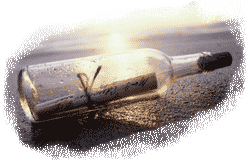May 2009
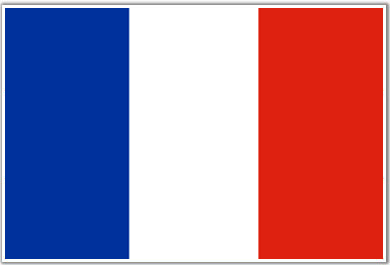
About Government misuses of Maritime metaphors
Many politicians (except may be, we shall see, a few sailors) are fond of maritime metaphors, such as " stay the course ', or "to firmly hold the helm ." Is it against the winds and tides of contrary opinions?
The etymology lends them some reason, since the word govern is derived from the Latin gubernare , inheriting itself from the Greek Κυβερνητική. It has given the term " cyber " and the scientific science of cybernetic that they hardly practice.
Although this term was introduced for them by Jacques-Marie Ampere, experience shows that they do not give to it as much attention as it would be helpful.
It is common to hear these metaphors in recent political discourses.
« Le plus difficile, c'est de résister à la pression et de tenir la barre.
Mon métier, c'est de transformer les informations en décisions, et j'y suis prêt.». »
(Nicolas Sarkozy 2008)
«J'ai un cap, je tiendrai ce cap »
(Nicolas Sarkozy 2008)
« c'est comme si quand on traverse une tempête et qu'on est marin, on se mettait à crier contre la tempête au lieu de tenir la barre »
(Laurence Parisot, president of MEDEF, 2009)
« Quand la tempête souffle, il est normal que les gens aient peur. Mais les Français doivent savoir qu'il y a un capitaine solide à la barre pour contenir les effets de la tempête et amoindrir les chocs sociaux. »
(Yves Jégo, State Secretary for Overseas).
One must be fair with the current politicians, since this was a former practice :
« C’est précisément à l’heure où l’Europe traverse ces difficultés - je n’utiliserai pas le mot "crise" mais plutôt difficultés, certes sérieuses - qu’il est plus important que jamais de maintenir le cap de l’unification et de l’élargissement européens »
(Jacques Chirac)
« Cher Jacques Chirac, [...] C’est à vous de marquer le cap, c’est à vous de tenir la barre d’une main ferme. Soyez confiant, sachez que dans cette navigation, vous avez ici votre équipage. »
(Juppe)
« Giscard à la barre ! »
(election slogan)
« Cela montre que ce sont les techniciens qui ont mené cette affaire et que les politiques n’ont pas su tenir la barre à temps (…). On fait l’union monétaire sans accompagnement politique. »
(Valéry Giscard d'Estaing).
« la Constitution donne au Président les moyens de tenir la barre. Elle est faite pour ça. »
(De Gaulle in 1966).
« Il faut tenir la barre en regardant l'horizon,
car rien de grand ne se fait sans une vue prospective... »
(Claude Labbé 1958)
As Edward Heath, Gaston Defferre and Michel Rocard, and including Jean François Deniau, some politicians had real maritime skills.
Strangely those there are hardly known to practice the navigation metaphors.
Perhaps it's because there would have been some facts a little difficult to explain, which are hardly conducive to the uses made by politicians that are ignorant in this area.
If " Firmly hold the helm" is one of the favorite expressions of policies, obviously their maritime reference remains about sailing ships. with the mechanical propulsion, the efforts on the rudder have disappeared, and so the need of "firmness" on the helm. For proof one need only observe that it is often mentioned in speeches "trim down" or not.
« Ce n'est pas le moment de réduire la voilure »
(Luc Chatel 2009)
to think about these metaphors, are they not practiced in a very imprudent way ?
Indeed, on a large ship, is it not unusual that the captain keeps himself the helm, as he has a lot of other things to do to ensure the conduct of the ship ?
In particular, on a large or small sailing ship, is it not captain of the concern to ensure the balance of the sails, so that the ship trend is not to "bear away" or too "head up" or that it tends to not "pull" or to "push" on the helm ? So this one is not "holds" never with a "firm hand" but "takes" with fingering and soft gestures,in order to "feel" the boat without ever to "force" she.
Could advance a ship to the best of its ability when the forces on the sail are not balanced ?
So maintaining the cape becomes a subordinate task, which requires neither effort nor great skill, and which is normally entrusted, watchkeeping after watchkeeping, to anonymous ensigns.
If the helmsman achieves the course changes or maintains it, does he have the initiative?
Whether on cargo boat or on transoceanic pleasure yacht, he is also often replaced by a robot...
... which is the result of a good use of cybernetics, that is mathematical formalization of statecraft.
Claiming to "firmly hold the helm", a "captain" would be misguided, rather than worrying before all things to balance the ship, to equalize and moderate the forces exerted by the elements on the ship.
Instead of focus on course, ignoring the sea state and wind direction, the Captain would clearly put a ship in danger by pretending ideologically "stay the course".
But this is so: marine metaphors they are not common practices persist among the commonplaces of political discourse ? Rather than simply resolving it, is not it better to deepen ?
It existed from good and bad sailors, as great and mediocre politicians.
The ill marine sea fortunes can teach us a lot about politicians fond maritime metaphors.
Today, when the economic storm in many countries the ships are "foul", as overthrown by the free surface of bad loans nearly ten times heavier than the one he lived in 1929, the history of Pamir is a good example.
In the vocabulary of the sailors, "foul" expresses a situation that all crew feared that evokes a state in which a ship has been led, without being able to escape safely.
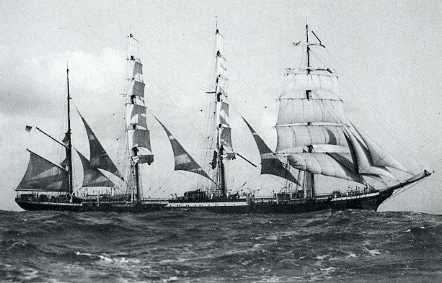
We remember the story of the shipwreck in 1957. The commander of the Pamir, Johannes Diebitsc, was a recent graduate. Even young he is, he had good people skills. He could have begin a legal career before turning to the merchant navy. His rhetoric was effective, and he knew at once convince the middle of shipowners, and be plebiscited by sailors, he would have learned to practice a bad German, and willingly introduced a few words of their slang.
He had new ideas about ships and was determined to reform the usages, to save endangered profitability of the last large trade sailboats.
On his first trip he hoped to maximize profit. It was for this, with the consent of its owners, is filling the ballast tanks located in the ship's bottom by the equivalent volume of barley cargo. Similarly, to reduce the duration of the stopover in Buenos Aires, he had remove interior bulkheads, and makes loading cargo in bulk via a hopper, with only a covering layer of sacks of barley in order to hold this in place. This represented only less than ten percent of the cargo.
Returning from South America, he was sailing at a good pace towards Europe. Starboard tack, the wind so from his right. In the opinion of the commander in second, heel to port was excessive. This could have been the opposite. It does no longer mattered. The second was beginning to regret bitterly, first to have obeyed, to have contributed to this situation, and then to be still onboard.
What could he do? The commander had reduced its role to the simplest expression. He took care of everything personally, speaking directly to the boatswain or to the sailors, deciding all the solutions he devised in the impulse of momentary emotions.
When the radio announced that the hurricane "Carrie" progressed on the drive the ship, the young commander decided not to turn away, and to "stay the course" hoping to surpass the passage in time of the storm.
Unfortunately has occured a gust of wind . The few bags arranged on the surface of the cargo were quickly hustled and the powdery gargaison, like a mass of bad loans battered together by a crowd of traders gradually began to flow to the heel.
As a last warning, the boat never regained his balance, keeping a strange heel despite a momentaneous the calm. The captain sent the crew in the hold to try to restore balance. Armed with some weak shovels, sailors were exhausted, trying unsuccessfully to redistribute the cargo. crisis of vain investments .
The boat could not wear all her sails. He dragged himself, losing all hope to leave, by a sufficient speed, the storm zone.
It was still time to tack, to gybe, and then send just enough sails in order to heel at the opposite side. The cargo, driven by the new orientation of its gravity interests would come somehow to balance the boat.
By which way would it be possible to put in place the necessary bulkheads? The second captain reminds himself with regret the rigid walls that the commander had dismantle, under the pretext that it would extend the duration of loading and unloading operations.
But by tacking he would lose face, recognizing his errors and his incompetence. So the order was given to stay the course.
Then came the storm, with a force that the young commander had never known.
When he changed his mind, it was too late. Because this time the cargo spilled, increasingly, inevitably, on the side where the clipper heeled, forbidding him any chance to recover. The ship was unresponsive to the helm.
Obviously it would have taken from the start, run away downwind. The order to tack in order to heel on other side was given too late, the ship was too fool to react. In fact no matter, the question of the ship heading was no longer relevant. Instead of wanting to save the cargo, he would had to decide in time to cut down the masts , decapitating the ship to save him before it capsizes and ... Too late !
He ended up sinking.
There were only six survivors.
The absence of any rigid bulkhead separating the cargo and the ideological obstinacy of "keeping the course" remind some claims (remove " rigidities ") and certain forms of governance, such as, for example, to claim, whatever happens, of" stay the course "and then inevitably to bear the brunt of the waves, and losing all action on the rudder, see with horror the ship tossed by the power of the sea, turning in all directions ?
The story had a great repercussion. The consortium of German owners was struggling to justify its practices. It could defend itself by arguing that the sheer force of the hurricane was such that in any case no ship could escape alive?
Who could tell? And could it justify their behavior so far?
In our maritime metaphor, the current economic storm is a kind of hurricane.
" One hand for yourself, one hand for the ship ," recommends the saying. However it depends a bit on which the ship is fool or not, voluntarily or not .
There is more or less well-designed yachts to face such circumstances. But when there are not suitable it is not the time to worry about it.
Would not it be suitable then to have the courage to seize these shears that any sailing boat for emergency purpose, and as soon as possible and cut the rigging, and so break down the masts ? Abandon them to the sea and let it flow without qualms some complicated rigging of financial firms ?
Coming back to the jubilees tradition of the kings of ancient Judea, described in Leviticus, could we give up our debts that become more than ever exorbitant ? Accept to loose in the City of London and Wall Street, any things that are physically separate from the real economy. And after the storm go away with a jury rig, waiting to rethink a new one ?
Some other shipwrecks are also instructives by their same implications of economic interests.
We well remember the ferry of the company Townsend Thoressen although strangely named "Herald of Free Enterprise" or in French the "Heraut de la Libre Enterprise".
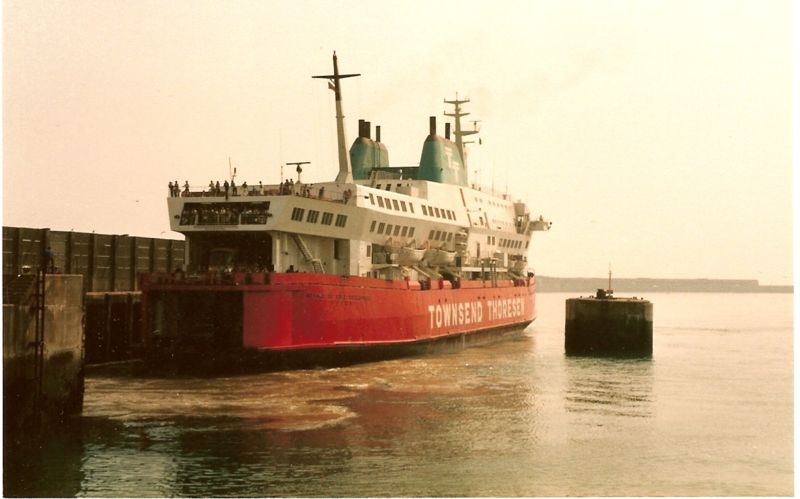
To enjoy optimum frequency of its rotation, and thus its financial performance, he used, (was he the only one of the company ?) leaving the dock of embankment before the front door, located at the bow of the vessel is closed.
This parallelism of the process allowed for strong clever way to reduce the length of the "critical path", thus increasing the yield and therefore the profitability of investments. Symbol of efficiency, the ships of the Townsend Thoressen and took the sea the mouth open, as if to bite a new competitive advantage. Alas, March 6, 1987, just outside the port of Ostend, a wave came through the front and filled the ship, which sank, body and soul, to the bottom.
There was followed the next day by her owner.
In the weeks that followed, all ships were painted in the colors of its parent company, the company P&O.
Honni Soit Qui Mal Y Pense !
So is an usage in some countries, across the Channel, to rename things in order to recover their tarnished reputation. In 1957 the Windscale nuclear plant in England had a serious accident with serious radiological consequences that led to condemn its facilities for long. In order for other reprocessing facilities may be built, next, on the same site, it was renamed Sellafield. To erase the memory ?
From a third shipwreck, the latter far more famous, it is useful to learn a few facts for what they are similar with some behaviors observed in crisis economic: That was the design of the Titanic and its sinking , and bailouts that followed.
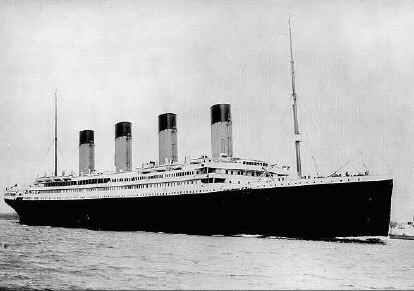
The systematic underestimation of risk to 8% of equity capital provided to counter the banks' risk also refers to the underestimation of the number of lifeboats provided on the liner.
The ship was as deemed unsinkable as seemed global finance as a whole. This limitation on equity in boats, was it so reasonable ?
During the sinking, women and children of first classes, then the men were the first to board it. And so did some farsighted financiers who sold their risky investments of which they could get available capital. To the detriment of public interest, "the winner take all."
When Lehman Brothers, yet respecting pretty well the criteria of Basel went sinking, many have seized the lifeboats, those who knew it was bound by multiple slings wings to other vessels. These in turn start heeling, in turn threaten to sink, throwing desperate SOS, requesting assistance to the Navy...
Unfortunately, in the world of floating exchange rates, there is little land in sight !
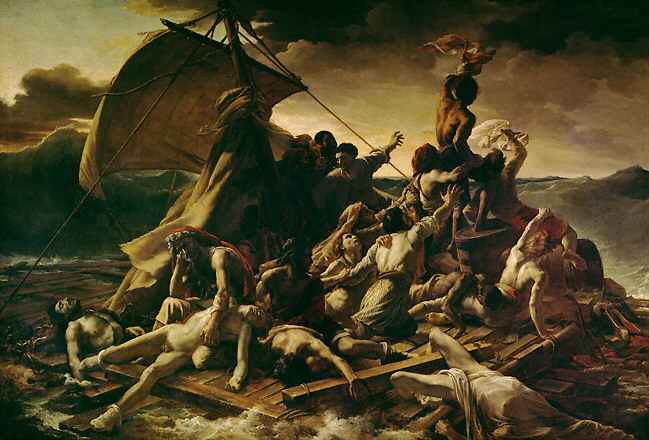
How not to be... ...Médusés ?
to follow, "Tribordais and Babordais"
>